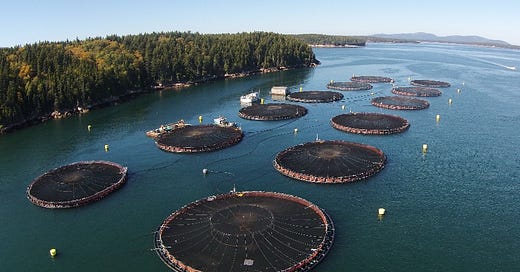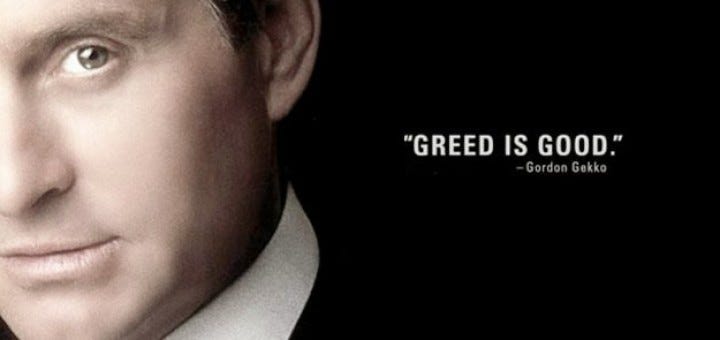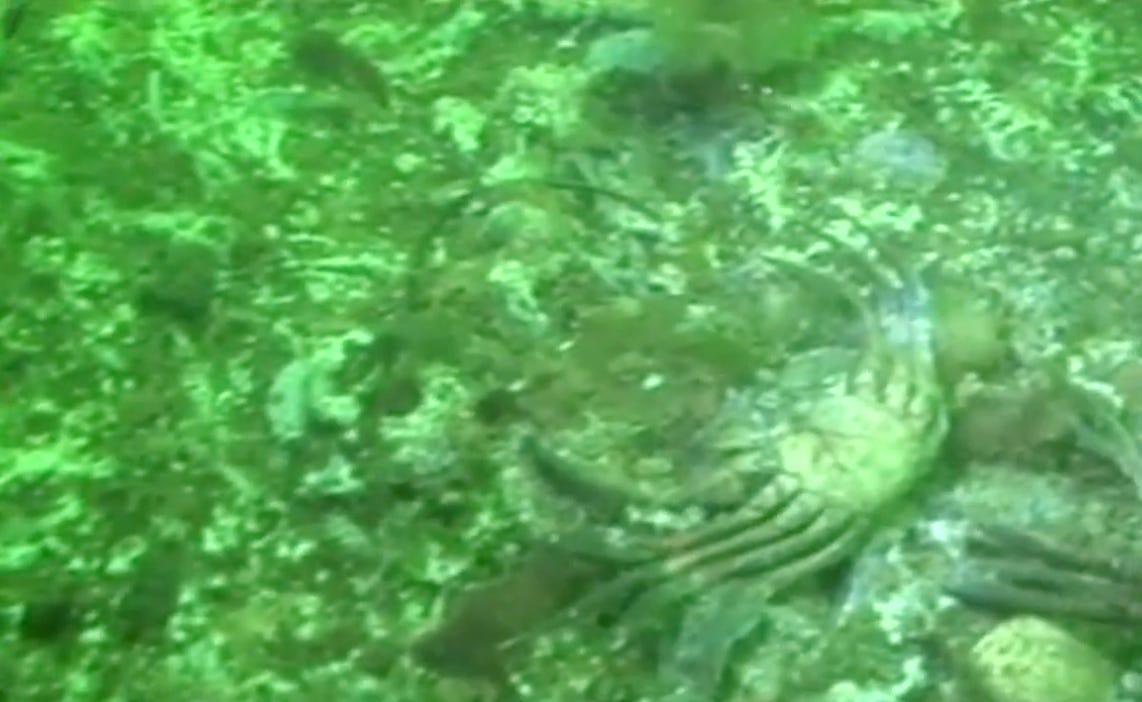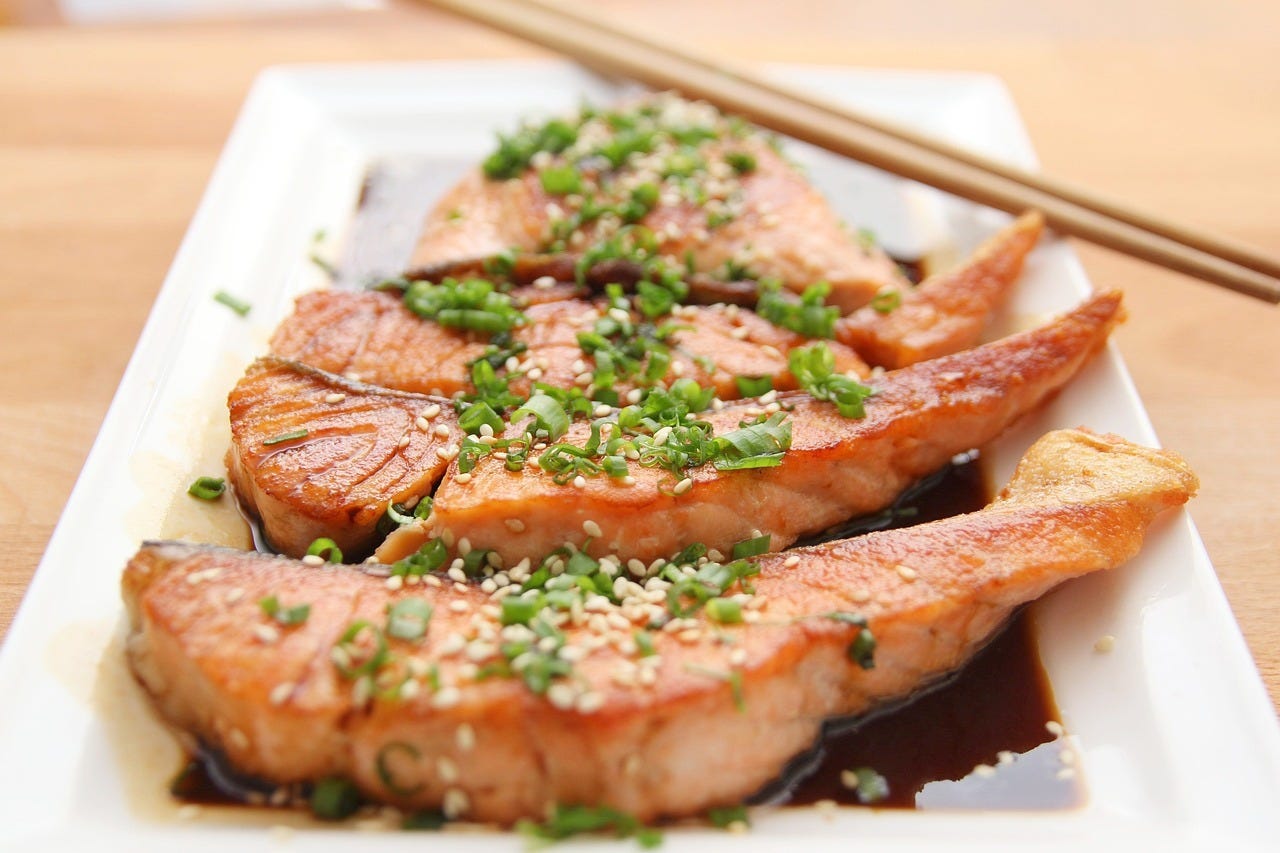I’ve wanted to learn more about salmon farms, so naturally I googled “salmon farms”, as one would, right? The very top search results was by the Global Salmon Initiative with an article entitled “What is salmon farming?” Seemed like a good place to start … and it was the start of one ocean-deep rabbit hole.
Brace yourself, grab a cuppa, this article is sprawling and spirals from the spheric heights of global capitalism and all the way down to the seabeds. Actually, even just writing that should make one thing clear: those spheric heights? They are not real. We have only made them so by telling ourselves stories we agreed to believe in (cue Yuval Harari’s “Sapiens”) - and the other? Those beds below our oceans? They are of course as real (and as fundamentally important) as can be, regardless of what we think.
The global economy
Darn me, already went off on a tangent. I’ll get to salmon farms eventually, promise. But allow me to start at the top, because here in the high seats of the global economy, here is where decisions are made. And the reason for those decisions is invariably profit, and more profit. I can hear you say “Duh” - I know, no great revelation. I’m mentioning it for another reason and the reason is that there are a great many well-meaning and well-intentioned people there, too.
I’ve worked in the corporate world for a good twenty-five years and have seen it all from the innermost inside, to the worlds of global finance and macro economy. And I can honestly say that I’ve met countless amazing people engaged in trying to make the global economy, the corporate organisms, the ways of business overall, better for planet and people. Innumerable scientists and experts of every type work for huge companies - and I’ve met some who were quite cynical about their role and efforts, but I’ve also met many who were passionately engaged and fervently believed that they could make a difference.
Hopes and promises
I’ve seen a few global financial crises in that quarter century. I’ve seen thousands (literally) of leaders come and go, I’ve seen the rise of risk management, of sustainability units, of DEI, of new generation leadership that embraced humanity, vulnerability, courage - true leaders living and leading with emotional maturity … and, of course, I’ve also seen the rise of stakeholder capitalism when, just before the pandemic, nearly 200 CEOs promised in writing that they would no longer be solely focused on increasing shareholder value (the aforementioned profit, and more profit), but also on the needs of employees, communities and other stakeholders … it sounded hopeful and downright wholesome.
It’s 2025 now and no one talks about stakeholder capitalism anymore. No doubt it’s made a difference here and there, but, by and large, nothing has changed from the Gordon Gekko’s “Greed is good” days. Well no, something has changed - and substantially so, the global economy has become far, far better at selling itself. Industries of every type are tied not just into politics with the usual lobbying efforts, but are very smartly positioning themselves as the good, the valuable, the sustainable, nay, the essential, stewards of the Earth and all-around decent helpers of people and nature and all else you can think of.
Greenwashing et al
Greenwashing’s one aspect of this, of course. But more often than not it is done in smarter ways, in more subtle and more insidious ways: Corporates give themselves foundations and think tanks and institutes and spin-offs and departments for this and for that - all staffed with people who genuinely care about their area of expertise and the betterment of the company and the future of humanity and planet - and all of them represent wonderful showpieces that absolutely do deliver their bit - but when you step back and look at the big picture, the corporate entity or the industry as a whole, you’ll see what all of those many efforts are essentially virtue signaling because, on a whole, industries are still focused on the one thing everything else is subordinate to: profit, and more profit.
Wondering why I keep phrasing it that way - “profit, and more profit”? Because it’s never just about profit. Profit (anything in the black and out of the red) is never enough. It always has to be more. Shareholders demand more, financial analysts demand more. And if the year’s been great - the next year has to be greater, because the system measures you by the previous year’s (even quarter’s) numbers. Oh how I’d love to jump into a rant about the financialization not just of the world, but of our minds - fascinating topic. That’s definitely a tangent too far even for this article!
The Global Salmon Initiative
The Global Salmon Initiative tells me that the UN’s FAO (Food and Agriculture Organization) “predicts that the world’s population will reach 9.8 billion by 2050, and the demand for food is set to increase by 50%, and demand for animal-based foods by nearly 70%. Fish, including farmed salmon, can offer a solution to meeting this increased demand.”
Well that certainly seems like a sound rationale … but the little person at the back of my head always asks me to look behind the curtain. In this case, to start by seeing who’s behind the wholesome sounding Global Salmon Initiative: the fourteen members operate in Australia, Canada, Chile Faroe Islands, Norway and the UK - and they represent about 40% of the global farmed salmon sector.
A quick gander showed me that ten of the above fourteen are among the top twenty largest salmon farming businesses in the world. So, of course, all of this is, first and foremost, about business, about putting a positive spin on it all, and about, always, growing that business ever more.
The Global Salmon Initiative says that fish farming is the fastest-growing global production sector. Citing massively decreasing fish stock caught by fisheries, it highlights: “The planet is 70% ocean and if managed responsibly, the Ocean Panel highlighted it could provide six times more sustainable food than it does today, offering a significant contribution to sustainable food systems.”
The Ocean Panel
Their above Ocean Panel link takes you to a 2022 8-page pdf entitled “Ocean Solutions That Benefit People, Nature and the Economy”. Now of course I wanted to know more about this Ocean Panel and who’s behind it. The full name for the Ocean Panel is “High Level Panel for a Sustainable Ocean Economy” and they say of themselves that they are “a unique global initiative that, by serving world leaders, is working to build momentum towards a sustainable ocean economy in which effective protection, sustainable production and equitable prosperity go hand-in-hand. By enhancing humanity’s relationship with the ocean, bridging ocean health and wealth, working with diverse stakeholders and harnessing the latest knowledge, the Ocean Panel aims to facilitate a better, more resilient future for people and the planet.”
Now doesn’t that sound nice? When you read between the lines, this is, again unsurprisingly, about business. They’re proud to highlight that world leaders have joined together on a mission of “sustainably managing 100% of the ocean area under national jurisdictions.” I cannot help but cringe when I read “managing the ocean”.
The right words are thrown in - equity, sustainability, resilience - but to me they are nice words words that allow members countries (who make up 20% of the world’s shipping fleet, 18% of the world’s fisheries and 42% of global coastlines) to have all the insights and language to keep growing the ocean extraction business. By the way, the Ocean Panel is co-chaired by Norway and Palau … Norway being the world’s largest producer of farmed salmon (followed by Chile). I’m sure they’re steering everything in the right direction.
The big salmon farming picture
The Ocean Panel initiative that has come together seven years ago - put up below graphic which reads really well - I mean who wouldn’t want that focus on sustainable production, effective protection and equitable prosperity? Right?
Look at that number! 15.5 trillion in net benefits from sustainable ocean investments by 2050 - now that’s some serious business. 12 million new jobs sounds nice, but is really peanuts in comparison with the trillions. Clearly, greater profits (cost effectiveness, fewer salaries, more automation) is the number one goal.
So there you have it The Global Salmon Initiative highlights those “6x more sustainable seafood by 2050” - and top left of the chart you see the moderately commendable aspiration of “30% fully protected MPAs (Marine Protected Areas) would restore and protect habitats and biodiversity.” … There my question is simply, if they are marine protected areas - why do they need further protection, and why only 30% and not 100%? Shouldn’t it go without saying that an MPA, any MPA, should be fully protected - after all, that’s why they’ve been given the MPA designation!
So how does a fish farm work?
Talking about size first - I’ve read that 90% (1.4 million tons) of the Atlantic salmon that is annually eaten by us comes from farms. I’m sure you’ll find different numbers in different places - but in any case, demand and numbers are huge. In addition to salmon, there’s the annual farmed production of carp: 3.2 million tons; shrimp: 1.3 million tons; Oysters and mussels: more than 13 million tons.
But let’s stick with salmon. Here’s how it goes: Salmon eggs hatch and the baby salmon are then called fry. These little ones are kept in freshwater tanks until they are about 12-18 months old - as this stage the salmon is called a smolt. Now they’re put into those floating ocean cages (see above). They then spend the next 1-2 years of their lives in those packed cages, are fed with pellets and “protected” against lice with chemicals and then they’re harvested. Hit repeat. Wikipedia tells me that, “modern salmonid farming systems are intensive. Their ownership is often under the control of huge agribusiness corporations, operating mechanized assembly lines on an industrial scale. In 2003, nearly half of the world’s farmed salmon was produced by just five companies.”
All’s well that’s farmed well?
Well, I guess that very much depends on how you define “well” - and how closely you choose to look at what happens in and below and around those fish pens.
Our species is hugely inventive, I mean, come on - we invented the vacuum cleaner, velcro and the velocipede (and a few other things). Our species manages to destroy just about everything, but we also manage to improve things - electricity, plumbing, medicine, etc. We have what it takes, if we only put our minds to it! This ramble simply to say that, whatever massive challenges fish farms may currently pose, there’ll no doubt be many to point out that betterment is on the way. And there are better ways. For example:
instead of feeding this farm salmon wild-caught fish, the future may be to feed them with plant-based food (I’ve read that, today, to get one kilogram of farmed salmon, you’ll have put in one kilogram of wild fish in the form of fish food).
And while currently those fish are given antibiotics and parasiticides to keep them healthy and diseases at bay, vaccines may eventually mean a massive reduction in chemicals.
I’ve also seen that everything from the pen (uneaten foods, chemicals, feces) can be captured, instead of letting it sink to the seabed. It’s called closed aquaculture (here’s one company’s example) - this also removes the fish lice problem.
Alas, that’s not where we are - while better ways exist, they are far from the norm. Currently, what you read are things like these:
“More antibiotics are used in Chile’s fish farms than anywhere else in the world. 339 tons in 2023. There is less systematic monitoring and fewer sanctions than in Europe. These conditions have made it easy for salmon farmers from Norway to expand into Chile.” (Can tech solve the biggest threats in the booming salmon industry - DW News)
Where we’re now
By and large, the roughly 3 million metric tons of farmed salmon (Norway alone harvests 30 million farmed salmon annually) live in those open cages and are reared with nutrients and chemicals and all of that, and mountains of feces, lands on the seabeds below those fish farms. And no, it’s not just the below, it’s also the around - as currents flow, nutrients, chemicals and feces have an impact on seadbeds around those fish farms.
The Norwegian Society for the Conservation of Nature - Naturvernforbundet - last year called on the Norwegian government to end the still common practice of open fish pens and demand that fish farming be free from discharge, and that everything that has already polluted seabeds (the call the conditions catastrophic) - and caused massive biodiversity loss - needs to be cleaned up. “Salmon farming has urgent problems with poor fish health and mass death, much of it the result of crowding, and this is just one of the problems. Also the massive pollution must end.” Here’s what they propose:
Canada plans to ban open-net fish pens in British Columbia’s waters as of mid-2029. Naturally, the status quo is up in arms and there will be war from now until then by those trying to overturn the decision. Norway’s minister for the environment has ruled out such a ban - even if he does acknowledge that all’s far from well: there’s the continued destruction of seabeds; there is the massive biodiversity loss; there are the diminishing numbers of wild salmon, a decline blamed on both climate change and escaped farm salmon and their diseases.
The more you look, the more you see that things far, far from sustainable from what what is always touted as a very, very sustainable business.
The destruction below the surface
Most fish farms are not far from the shore. They are set up in areas like fjords, inlets, bays - areas that are protected and sheltered from storm surges. There are around 1600 salmon farms operating in Norway, Chile, Canada and Scotland alone. Norway has fish farms up and down its coast - and so they’ve expanded their business (because, remember, in business profit is never enough, it needs to be more profit) more and more to become the powerhouse they are today with lots of fish coming directly from Norway - and many Norwegian super-sized companies operating fish farms elsewhere in the world … which brings me to Scotland.
When I was up in Scotland’s Wester Ross region recently, I learned about fish farms in marine protected areas. Two members of the Blue Hope Alliance told me how local fishermen and divers, the whole community, had come together to protect “their” MPA. The Scottish government has over 250 marine protected areas - but whether protected or not, fish farms are officially still not seen as problematic for the environment.
In a 2023 presentation, world-leading maerl expert Professor Jason Hall-Spencer of Plymouth University showed below map - you clearly see that maerl beds exist in the exact environments where the big Norwegian companies like to place their fish farms. Go here to learn more about maerl.
In his lecture, the professor says that he was asked by the Scottish government to analyze the effects of fish farms. He investigated at three places (the three red triangles) and found that the governmental guidance was wrong. According to their computer models, fish farms simply had to move from place to place with strong water currents to allow the food/chemicals/feces to be blown away and disperse so that it would have little to no impact on the environment.
However, with maerl beds, nothing was dispersed. Because of their composition, of their woven, coral-like habitats, whatever refuse descended onto it, stuck to it - and then proceeded to suffocate it - and thus the habitat all other creatures depend upon. The result? Wide-spread destruction of rare maerl beds that require thousands of years to grow.
Professor Hall-Spencer says, “It saddens me. They paid me to do this research. I gave them the scientific evidence and yet they still give out licenses to fish farms on maerl beds.” The government for their part said that it is “beyond reasonable scientific doubt that the controlled activity is not capable of hindering the conservation objectives of the marine protected area.” … Who are you going to believe? The eminent scientific experts on maerl beds - or political and thus monied considerations?
Where in the past fish farms just sprayed lice killer chemicals into the water, it was eventually realized (duh) that this had a detrimental impact on all other marine life. So they incorporated the lice killing chemicals into the fish food. As you now know some of the food, same as the feces, just sink to the seabed. These chemicals are designed to destroy insect-like organisms, as the professor explains. In the sea, he says, insect-like organisms include lobster and crabs, and many other creatures.
“Under the fish farms we looked at all over Scotland, you get huge densities of crustaceans, large crabs for example and Scot lobsters, gorging themselves on the waste material from the fish farms. But it’s terrible, because then they die, and the bodies of those animals build up underneath the fish farms and then rot. And that causes knock-on effects over quite a large distance.”
One thing that particularly struck me was when he says that, after dives in such places, it stinks, that you come out smelling like rotten eggs, because of the stench of the rotting organisms. Imagine that.
You should definitely watch Professor Hall-Spencer in this video for his final statement, which I won’t transcribe here. Go to min 27:00. The man has a few very salient points that, essentially go straight back to my opening statement. Where does real power lie? Who makes the big decisions? Could it be the people that are all about profit, and more profit?
Finally …
Feeding humanity is a good idea, let’s definitely continue to do that. The idea that everyone needs to eat salmon, however, is ludicrous. Just like the meat industry, the fish farming industry should be downsized. And a ban of open pen fish farms should go into effect immediately, especially since closed options already do exist, pens that remove what’s controversial/destructive/unsustainable about most current salmon farms. Any waste from salmon farms should be contained and removed, nothing should be able to contaminate/destroy marine habitats.
To my mind, it should go without saying that no fish farms, at all, should be allowed in protect marine habitats anywhere in the world. These are the very zones where nature should have the chance to recover and flourish - with its returned biodiversity spilling over beyond the protected areas - these are straightforward wins for humanity.
Looks yummy, doesn’t it? But now that I know quite a bit more, I’ll think twice before buying salmon. You should, too. If it says “farmed salmon” on the label, skip it - it is likely as far from sustainable as can be. Do not support seabed polluters.
So, does the world need that much salmon? Of course not We can also get our omega-3 fatty acids from other seafoods, from seaweed, from chia, soy, walnuts, you name it. But if you do want that salmon on your plate, then at least make sure that it comes from a closed-pen fish farm, or a land-based salmon farm.
Then of course there’s also wild salmon (that often is nowhere near wild). What you buy there is also worth investigating (and definitely requires its own article - together with the topic of hatcheries (watch the video at the end to learn all about that head-scratching endeavor).
Check out the Global Salmon Farming Resistance to learn more about people and organizations around the world trying to end open-net salmon farming.
Done for the day.
Cheers,
PS: If you can take the time, here’s an excellent documentary that focuses on both the illusion of hatcheries (a huge subject for another article!)) and, as of min 50:00 of the documentary, fish farms. You’ll see well-intentioned programs, you’ll see corporate and political greed, you’ll see mounds and mounds of ignorance … and you’ll also see that, when people come together to fight for better ways, it can happen. Grassroots efforts led the US State of Washington to decide that all Atlantic salmon open net pens be removed by 2022. The documentary ends with these words - they are simple, they are clear, and scientific analysis makes them fact:
“Hatcheries and open-water fish farms are driving wild fish to extinction around the world.”
If you enjoy the Rewilder Weekly …
… consider supporting my work. Your paid subscription will help generate the funds needed to realize a unique rewilding book I’m working on. And, of course, that paid subscription also ensures that the Rewilder Weekly will always keep going for those who cannot afford to pay. A thousand thanks!


















Gosh it’s so upsetting but important- thanks for saying the truth of things.